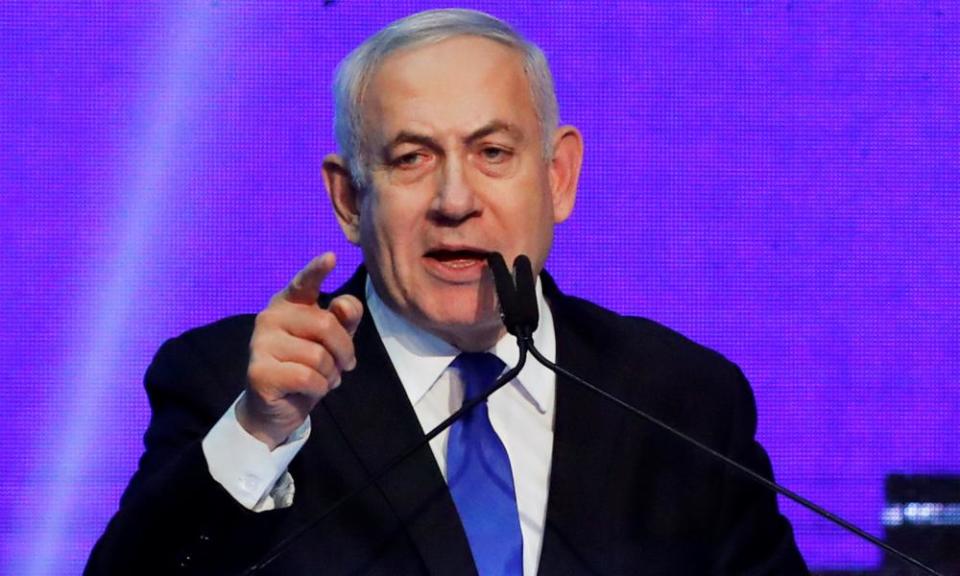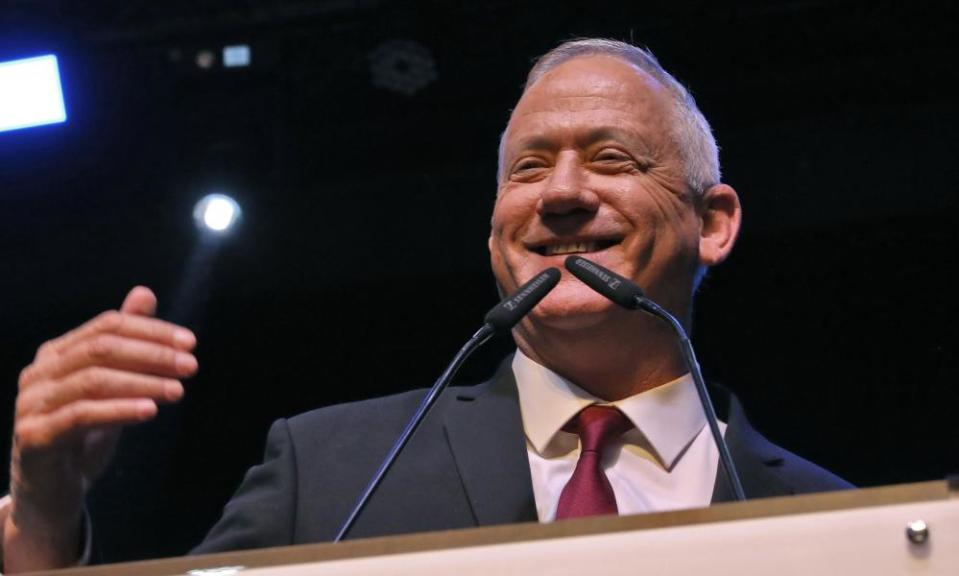Israeli election: lengthy coalition talks loom as early results point to deadlock
Benjamin Netanyahu and his main rival, Benny Gantz, have both vowed to lead Israel’s next government, despite early results and exit polls appearing to show neither had a clear path to form a coalition.
An inconclusive result from the country’s second election this year could plunge Israel further into political mayhem, with the prospect of weeks of tense political deal-making or even a third vote.
With 62% of the vote counted, official results put the opposition Blue and White party on 25.66% and rivals Likud on 25.03% with a total of 25,000 actual votes between them.
Israeli news outlets, citing sources within the country’s elections committee, reported that around 90% of votes had been counted and showed a dead heat with the two main parties at 32 seats in the Knesset each, below the 61 needed to secure a parliamentary majority.
With both Netanyahu and Gantz almost certainly requiring support from smaller parties to form a government, minor differences in official results could significantly alter the outcome of the vote. A large turnout from Israel’s Arab minority could also impact the result.
Netanyahu has sought to extend his record-breaking time as prime minister by forging alliances with hardline religious politicians and appealing to far-right ultra-nationalists.
In a 3.30am speech to his party in Tel Aviv, the sullen-looking prime minister spoke on stage in a hoarse voice, after spending the day rallying his supporters with a megaphone.
Related: For Palestinians, Israel’s elections promise nothing but defeat | Raja Shehadeh
“In the next few days, we will begin negotiations to form a strong, Zionist government and in order to avert a dangerous, anti-Zionist government,” he said.
Also speaking overnight, Gantz called for a unity government with members of Netanyahu’s Likud party but not the leader himself. “We will act to form a broad unity government that will express the will of the people,” he told supporters at a post-election rally in Tel Aviv. He however cautioned that he was waiting for final results.

Israel’s election commission said 69.4% of all eligible voters cast ballots in Tuesday’s elections, a slightly higher proportion than in a previous vote in April that was scrapped when Netanyahu failed form a government.
Once the vote is counted, party chiefs will recommend to the president who they plan to back as leader. The president then tasks that person with forming a government, giving them up to six weeks to do so.
The exit polls suggested Gantz could be that person, especially if he can forge a deal with Israel’s Arab parties.
Netanyahu, who has demonised the country’s significant Palestinian Arab minority as a fifth column throughout the election campaign, told his supporters that could never happen.
“There neither will be nor can there be a government that relies on anti-Zionist Arab parties,” he said. “That simply can’t be. It’s inconceivable.”
The 69-year-old leader is fighting not only for his political life but also his freedom. Pre-trial hearings for three corruption cases against him are just weeks away and a majority in the 120-seat parliament could help grant him immunity from prosecution.

Gantz has headed a campaign squarely focused on Netanyahu’s divisive politics and personal scandals, presenting himself as a clean and responsible alternative.
To win support from Israeli rightwingers and settlers, both men have attempted to sell the promise of an expansionist Israel that extends its borders deep into Palestinian territory.
Netanyahu vowed last week to declare up to a third of the occupied West Bank as part of Israel if he was re-elected and Gantz swiftly accused his political opponent of stealing his idea.
President Reuven Rivlin said he would do everything in his power to avoid another election campaign.
Netanyahu’s attempts in May failed after ally-turned-rival, Avigdor Lieberman, refused to join the coalition government unless the prime minister agreed to rein in Jewish ultra-Orthodox politicians. Lieberman, a staunch secularist, has seen his popularity spike and he could come out of the election as a kingmaker.
Addressing his supporters late on Tuesday, Lieberman said on Tuesday night that he also wanted a broad, secular coalition with both Blue and White and Likud.
As in previous elections, Netanyahu has ramped up anti-Arab rhetoric to appeal to the far right. Last week, Facebook temporarily shut down a chatbot on his official page for breaching the company’s hate speech policy after it warned of Arabs who “want to destroy us all”.
This year, Arab parties ran under a single alliance in an attempt to raise their joint influence, a strategy that appeared to have worked. Turnout among Arabs was 61%, up from 49% during the April election.
Ayman Odeh, leader of the main Arab faction in parliament, said Netanyahu’s attacks on the minority had had the opposite effect than intended of boosting their numbers. “There’s a heavy price to pay for incitement,” he said.

 Yahoo News
Yahoo News 
